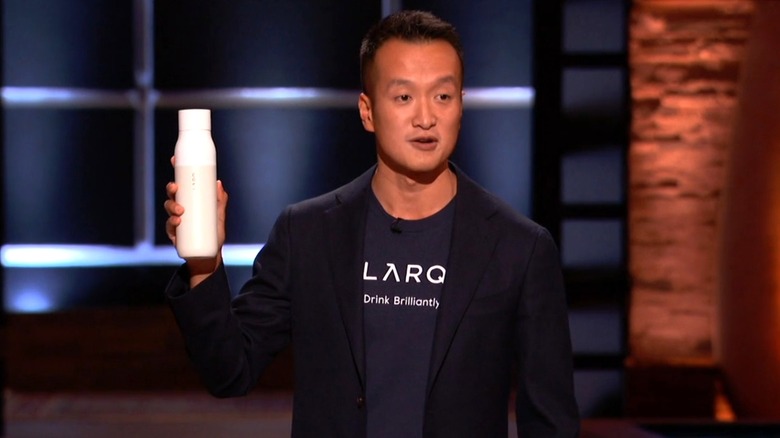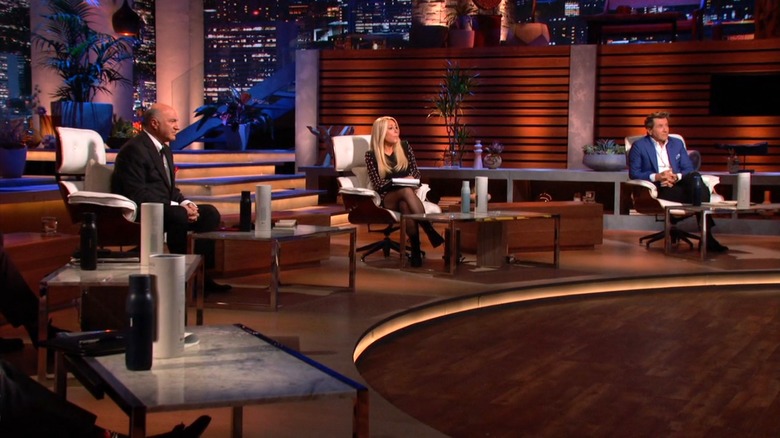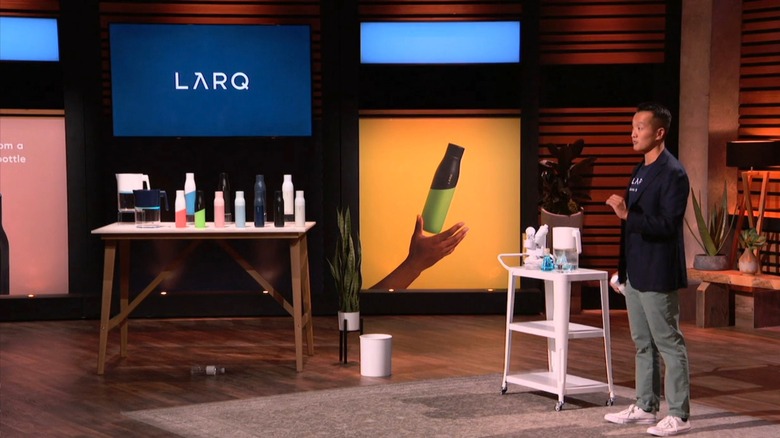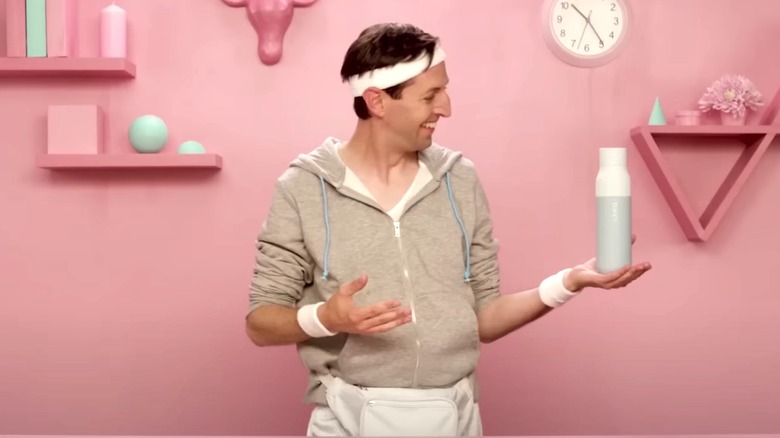What Happened To LARQ Water Bottle From Shark Tank Season 12?
We may receive a commission on purchases made from links.
With more than a dozen seasons worth of pitches under its belt — such as the IcyBreeze in Season 7 and the Arkeg in Season 4 — the sheer number of gadgets, gizmos, and devices that have made an appearance on the prime time reality hit "Shark Tank" is legitimately staggering. However, that massive tally is offset by the considerably smaller number of products that manage to entice the likes of Kevin O'Leary, Lori Greiner, Robert Herjavec, Daymond John, and Mark Cuban to stake their own hard-earned cash on one offering or another. The number is, of course, further offset by the even smaller number of products that become a hit in the marketplace.
Even still, once in a while a product makes its way to the "Shark Tank" sound stage that seems to have "hit" written all over it. That's assuming both the entrepreneurial pitcher and the opportunistic sharks can find enough common ground to strike a deal. That was very much the case during a Season 12 episode that found Justin Wang in search of funding to scale-up operations at his company, LARQ. He does so by pitting LARQ's self-cleaning smart water bottles as a potentially game-changing device in the clean water and reusable bottle market sector.
As "Shark Tank" viewers can attest, it takes more than a good product to strike a deal with the series' shrewd crew of potential investors, and Wang's pitch indeed went a little sideways before he righted the ship. Here's what happened to LARQ after that fateful "Shark Tank" appearance.
What happened to LARQ on Shark Tank?
To be fair, "sideways" may be a bit of an understatement in regards to the opening moments of Justin Wang's "Shark Tank" pitch. In fact, the LARQ founder's initial financial terms actually elicited laughs and guffaws from every shark on the panel in that Season 12 episode, with Wang offering just a 1% stake in his company in exchange for a $500,000 investment. So underwhelming is the offer in the eyes of Robert Herjavec that the shark even asks the LARQ founder to confirm he'd heard the terms correctly.
Kevin O'Leary was also quick to not those numbers made LARQ the highest valuation requested on the show to that point at roughly $50 million. Undeterred by the snark, Wang continues to flush out his vision for LARQ, and soon enough peaks the interest of the skeptical sharks. That's in no small part because LARQ had already become a minor presence in the reusable water bottle market prior to Wang's appearance, with Wang claiming company's cleverly designed bottles — which utilize UV rays to both sterilize an empty bottle or purify the water therein — boasted sales in the millions.
Impressed by the sales numbers, and the potentially massive market for LARQ water bottles, Wang managed to enter into negotiations with O'Leary, Herjavec, and Lori Greiner, and nearly convince the three to partner up to the tune of $1.5 million after offering a larger stake in LARQ. Herjavec, however, balked at some of Wang's terms and pulled out of the deal. In the end, Wang locked Greiner and O'Leary in for $500,000 each in return for a 4% stake in LARQ.
Was LARQ successful after Shark Tank?
Given that Justin Wang's "Shark Tank" pitch began with dismissive laughter, it's impressive that he managed to walk out of the studio with double the investment money he was seeking while only slightly upping the ownership offering in LARQ. But given how well the self-cleaning devices had already been performing in the reusable water bottle market — though he didn't invest, even Daymond John admitted he already owned two LARQ bottles himself — Wang was clearly right to hold his ground. In case there's any question, LARQ has continued to grow its market presence in the years since that "Shark Tank" appearance.
As of this writing, however, it's unclear whether or not the "Shark Tank" deal with Kevin O'Leary and Lori Greiner actually closed, and it might be worth noting that LARQ is not currently listed in the former's investment portfolio from the hit series. Whatever the case, it would seem LARQ was hardly in desperate need of the "Shark Tank" funding, with Forbes reporting that Wang had secured $11 million in Series A funding before his appearance on the show.
Though LARQ may not have padded that number with an additional $1 million bucks from "Shark Tank," one could easily argue the appearance gave Wang's company a profile boost that you can't put a dollar amount on. Since that appearance, LARQ has seriously grown its presence in the retail market, and can currently be purchased through several high-profile retailers, including Best Buy, Williams-Sonoma, The Container Store, and Amazon, among others. In turn, Wang also told Forbes in 2021 that the company was projecting as much as $30 million in sales in 2022.
What is next for LARQ?
Unfortunately, we have not been able to confirm those 2022 sales projections, or LARQ's sales figures from 2023. However, the company is not only still in business, but appears to be on steady ground with Justin Wang still listed as the founder and CEO of LARQ. As for what the future holds for LARQ, it should be noted that Wang and his team have moved beyond just producing some of the best smart water bottles on the market, having also released an in-home self-cleaning water pitcher since appearing on "Shark Tank."
That product put the upstart LARQ in competition with home water filtration giants like PUR and Brita, and the move proved a fortuitous one for LARQ, with the company having been acquired by Brita for an undisclosed amount early in 2024. To be clear, LARQ was not acquired by the same Brita that's been selling water filtration systems in the U.S. for the past few decades. Rather, LARQ reportedly sold to Brita GmbH, the German company that sold its North and South American sales rights to Clorox in 2000.
As it is, Brita GmbH continues to sell under its recognizable name in Europe, and may be looking to leverage LARQ's innovative tech and brand recognition as a way to re-enter the U.S. sales arena. Likewise, the deal with Brita GmbH would appear to open the doors for LARQ to grow the sales of its products on the European continent, marking a win-win for both companies. Only time will tell how the deal will pan out for each, but for now the future looks quite bright for LARQ.
"Shark Tank" is available for purchase on Prime Video.



